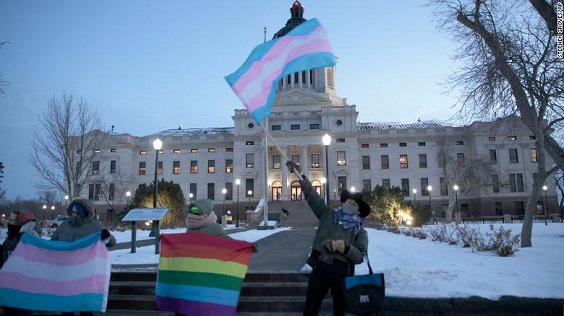You may have noticed that, especially compared to a couple of years ago, you don’t hear much about anti-transgender bathroom legislation anymore.
It’s because opponents of trans rights realized this strategy to deny trans people their identities and exclude them from society didn’t work. They had put years into a strategy to sway the public toward hatred and vitriol against trans people with false and harmful promises.
But the public didn’t buy it. LGBTQ+ groups across the country like Pride Foundation mobilized through organizing, public education, and policy advocacy to fight back against these destructive narratives, and to lift up the breadth of trans and gender diverse experiences through courageous storytelling and strategic organizing efforts.
The problem is, those same opponents didn’t back down after they lost. They just shifted tactics.
Their latest attempt to persuade the general public against the rights and lives of trans and gender diverse people is centered around excluding trans people, and trans girls specifically, from sports.
All across the U.S. over the last 3 years, there have been laws passed and bills introduced seeking to ban or restrict trans and gender diverse people from playing sports. In 2020 alone, 20 states introduced such bills.
These opponents of trans rights want you to believe that these are independent, organic, grassroots efforts being brought forth by concerned local politicians, but in reality, it is a coordinated national effort that picked up exactly where failed bathroom legislation left off.
Make no mistake: this fight has never been about bathrooms or sports. This is about a group of people that believe trans and gender diverse people deserve less than their full humanity. Deserve discrimination. Deserve the denial of their rights, their lives, and their full selves.
The opposition is once again using false narratives, scare tactics, and harmful lies to try to accomplish their goals, and not only is this wrong—it has real and lasting impacts on the trans and gender diverse people in our communities.
Here in the Northwest, Idaho’s legislature passed a law last year banning the participation of trans people in sports—which was blocked by an injunction in August that called into question the law’s constitutionality. There is a nearly identical bill in front of Montana’s legislature as I write this, one of many anti-trans bills introduced in this session.
Despite the tension and fear that so many in Montana, Idaho, and across the country are holding in this moment, we couldn’t be prouder of the ways our communities have shown up.
Organizers, legal and legislative advocates, community members, researchers, and local supportive businesses have galvanized over this issue and are working to put into place the research, stories, and efforts required to uphold the rights of trans and gender diverse students, and once again hold back the discriminatory efforts aimed at denying people in our communities their full humanity.
Thank you to all of our incredible community partners across the region and country for your brilliance, courage, and perseverance. We know that our collective efforts are building a world where we will not have to fight for the right to be fully ourselves in all of the places we call home, but until then—we are here. We are together. And we won’t stop until we achieve that reality.
Katelen Kellogg is Pride Foundation’s Communications and Outreach Manager.
